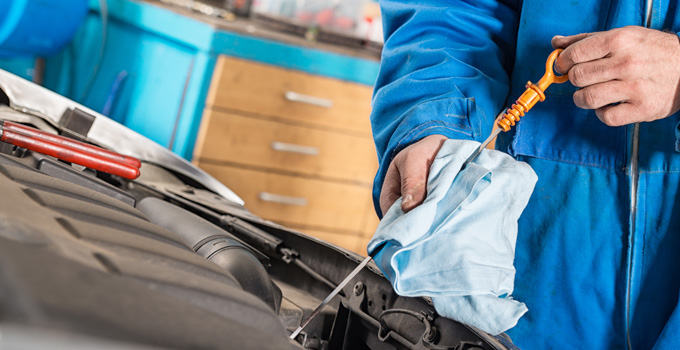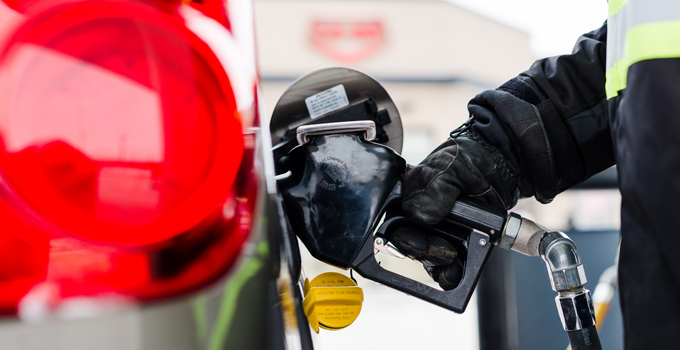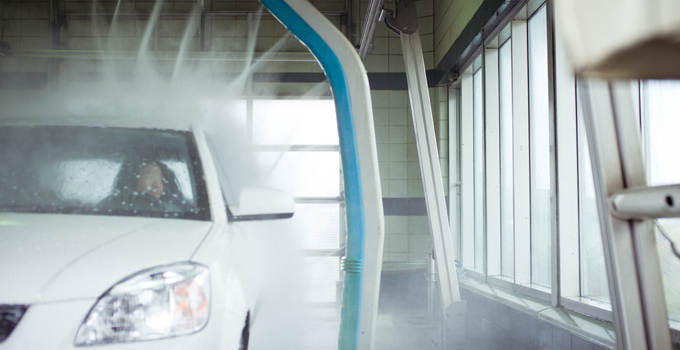 TAKE CARE IN THE COLD
TAKE CARE IN THE COLD
Living in Western Canada means a lot of things: beautiful landscapes and friendly people but also really cold temperatures, snow and ice. Take the good with the bad, and prepare yourself for winter conditions on the road.
Winterize your vehicle
Harsh winter conditions can take their toll on vehicles. Switching to winter-grade products can help provide protection for your vehicle and passengers and ensure your vehicle is running at its best.

Winter-grade products can withstand temperature drops and are available in windshield wiper fluid, engine oil and coolant. Find the correct grade of oil on your vehicle’s oil cap or in your owner’s manual.
Winter tires help improve stopping and starting on snowy and icy roads. Cold weather causes all tires to deflate which can affect steering and increase breaking distances. Low tire pressure can also cause an increase in fuel costs due to poor gas mileage and excessive tire wear. Always consult your owner’s manual or the sticker in your door jamb for the correct tire pressure.

High-performance fuels
The Co-op Refinery Complex (CRC) in Regina, Sask., has a team dedicated to ensuring fuels adhere to federal and provincial regulations and meets the needs of Western Canadians.
To provide fuels with power and performance, the CRC formulates blends tailored to the Western Canadian climate. On the diesel side, these blends can change more than a dozen times throughout the year, providing Co-op members and customers with the best-performing fuels possible, no matter the season.
Co-op also offers Top TierTM gasoline which protects all gasoline engines, optimizes fuel economy, improves vehicle performance and reduces harmful emissions.
Keeping your tank full also offers two other benefits: additional weight to improve traction on icy roads and reduced condensation that can lead to starting and running problems.

Winter car wash
Protect the body of your vehicle by washing your car throughout the winter. Corrosion usually begins in areas where road salts are able to collect: the front grille, quarter panels, undercarriage and areas around the wheels.
If possible, remove any ice buildups around wheel wells and bumpers prior to your wash to ensure the high-pressure water and wax is able to clean your vehicle directly. Following the wash with a wax will help deflect road salt and dirt from sticking to your vehicle in the future.
To reduce the likelihood of your door or windows icing up, choose a warmer day to wash your vehicle. Carrying towels to dry off excess water and driving your vehicle for a few minutes after the wash can also help.
Emergency kit
Unexpected problems do occur while on the road. Be prepared with an emergency kit that is easy to access. Depending on your unique needs, such as family or pets, some basic items can ensure safety in unanticipated circumstances. Items such as flashlights, candles, extra batteries, snacks, water and a first aid kit have the power to increase comfort. A shovel, warm clothes or blankets, booster cables and a tow rope in your vehicle are great safety items to have on hand in case disaster strikes.
Be prepared
Before every trip on the road, take a look around your vehicle to ensure everything is in proper working order. Make sure tires are properly inflated, fluids are topped up and wiper blades are in good condition.
Most importantly: Review road conditions and drive with care, allowing enough time to safely get to your destination.